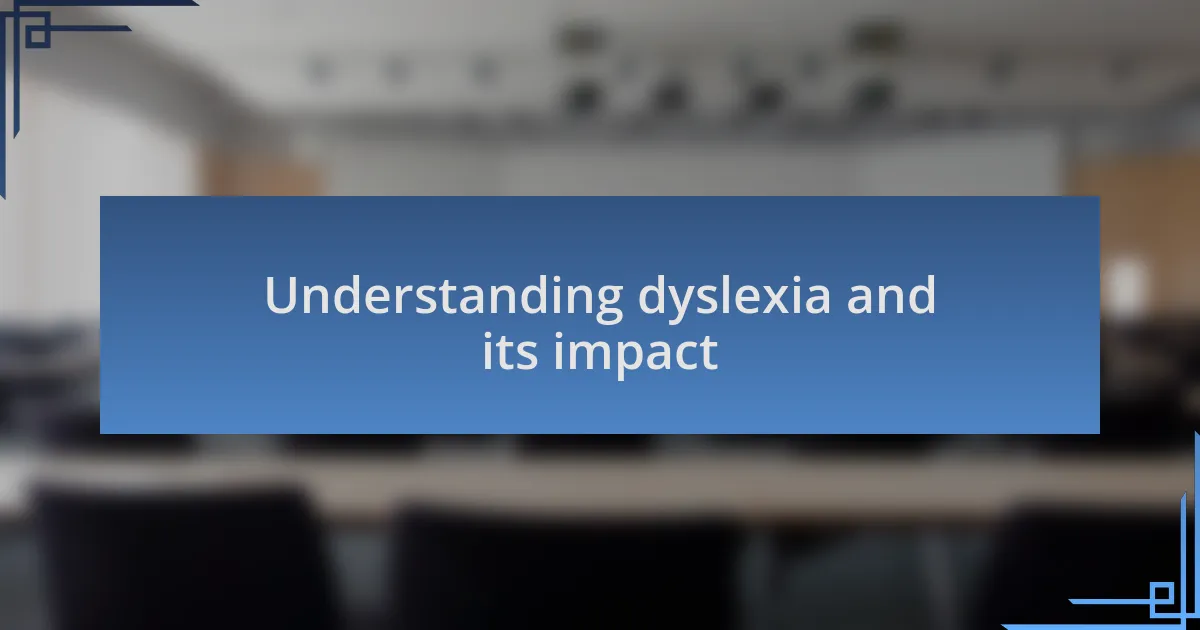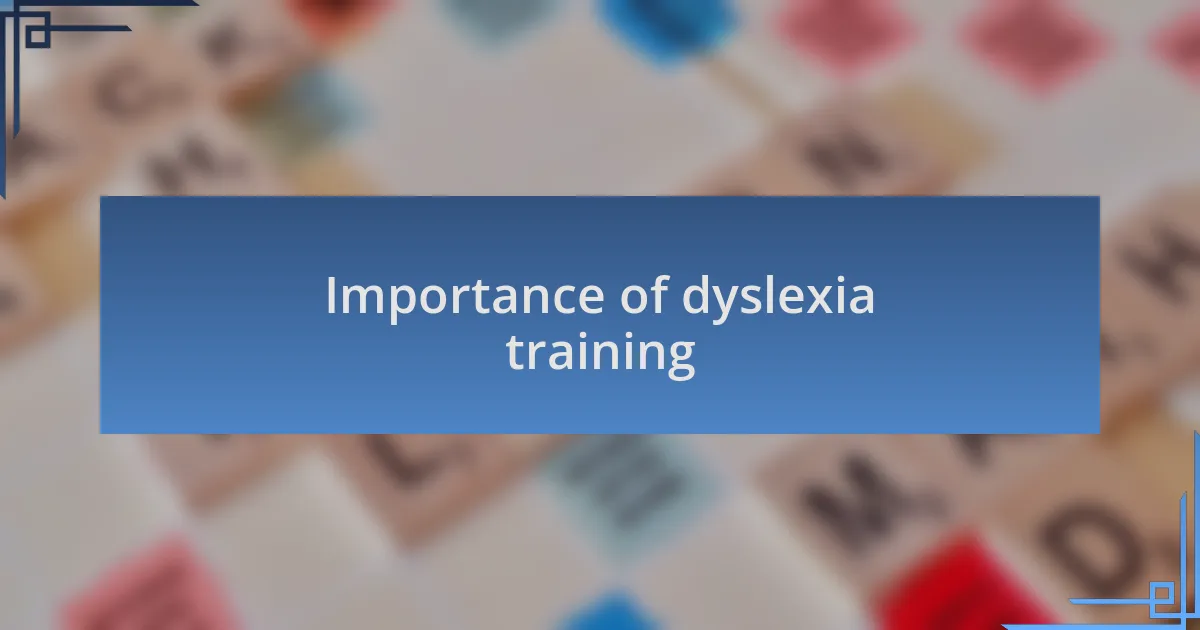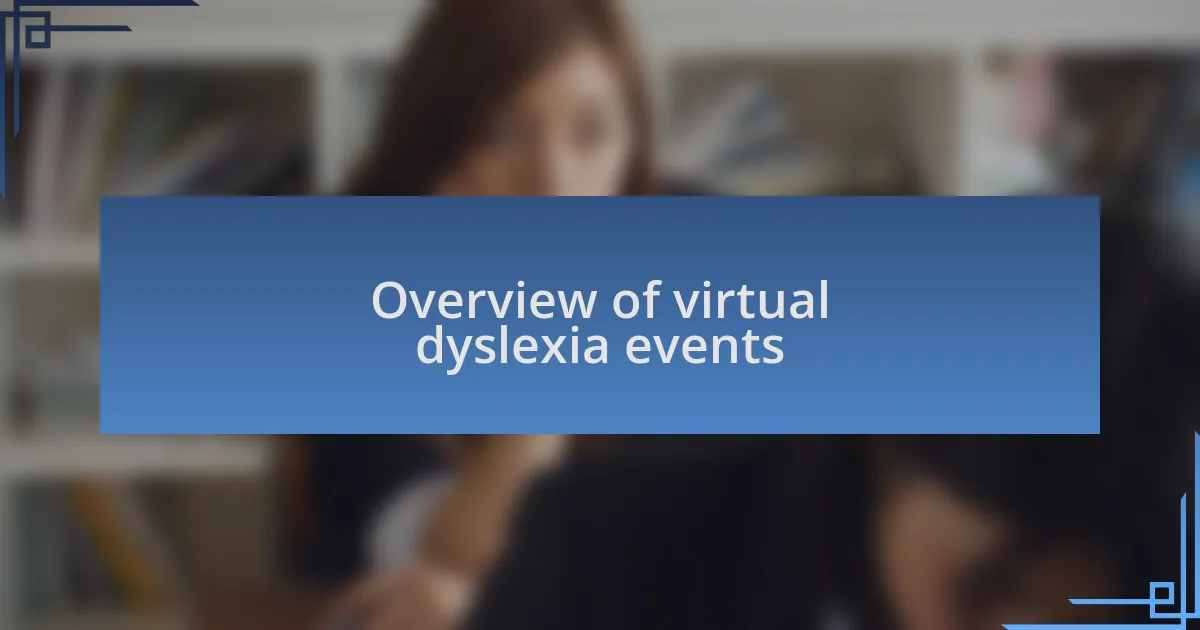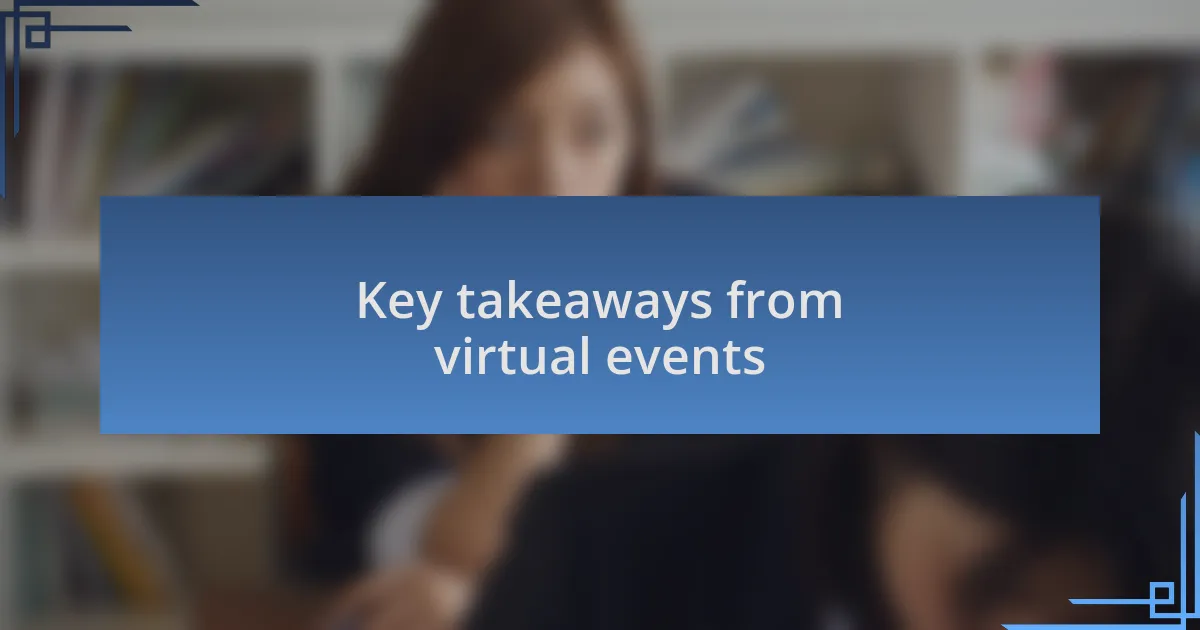Key takeaways:
- Dyslexia affects self-image and social interactions, leading to emotional challenges beyond academic difficulties.
- Dyslexia training is crucial for equipping educators and parents with strategies to support individuals with dyslexia and reduce stigma.
- Virtual dyslexia events enhance accessibility and inclusivity, allowing a broader audience to engage in discussions and share experiences.
- Participants gain valuable resources and innovative teaching methods, fostering ongoing learning and creativity in supporting dyslexic learners.

Understanding dyslexia and its impact
Dyslexia is more than a reading difficulty; it often carries with it a spectrum of emotional challenges and self-image issues. I remember a time when a friend of mine shared how her dyslexia made her feel isolated in school. The frustration of not being able to express her thoughts fluently led her to question her intelligence—how many others have experienced similar feelings of inadequacy?
The impact of dyslexia can extend beyond academics, influencing social interactions and self-esteem. I’ve seen students who excel in creativity and critical thinking struggle with writing tasks, leading them to doubt their capabilities. Why should a learning difference define one’s potential when the skills and talents they possess shine elsewhere?
Understanding dyslexia requires us to look beyond the classroom. For many, it can create a unique lens through which they view the world, often fostering resilience and creativity. Reflecting on my own experiences, I’ve found that those who navigate dyslexia often develop problem-solving skills and empathy that are impressive in complexity. How can we nurture these qualities instead of just focusing on the difficulties?

Importance of dyslexia training
Dyslexia training is crucial because it equips individuals, educators, and parents with strategies to understand and support those with dyslexia. When I attended a dyslexia training workshop, I discovered tools that not only clarified what dyslexia is but also offered practical ways to engage learners effectively. How transformative would it be if every educator could confidently implement these strategies in their classrooms, fostering an inclusive environment?
Additionally, effective dyslexia training can promote awareness and reduce stigma. I remember participating in a session where a facilitator shared stories from adults with dyslexia who triumphed over their challenges. Hearing these experiences made me realize how essential it is to cultivate compassion and understanding in our communities. Isn’t it time we celebrate differences rather than shying away from them?
Ultimately, proper training helps dismantle the myths surrounding dyslexia and empowers those affected to harness their strengths. From my viewpoint, the more we learn about this condition, the better equipped we become to advocate for individuals with dyslexia. How can we expect change if we don’t prioritize education for ourselves and others who significantly impact a dyslexic individual’s journey?

Overview of virtual dyslexia events
Virtual dyslexia events have emerged as game-changers in the field of dyslexia training, especially during the recent years when accessibility became a primary concern. When I first attended an online dyslexia conference, I was pleasantly surprised by how engaging the remote format could be. The ability to connect with experts and participants from around the world created a dynamic atmosphere that often fosters richer discussions than I’ve experienced in traditional settings.
These events often include workshops, webinars, and panel discussions that spotlight diverse perspectives and innovative strategies. I remember participating in a session that focused on the use of technology in supporting dyslexic learners; the insights shared were enlightening. Have you ever considered how much technology can change the learning landscape for dyslexic individuals? It feels empowering to realize that we are harnessing these tools effectively.
Furthermore, virtual platforms allow for greater flexibility and inclusivity, enabling individuals who may have previously faced barriers to attend. For my own part, I’ve seen friends who are unable to travel due to health constraints participate actively online. It brings me joy to know that these events can reach a broader audience and help more people find their voice in discussions about dyslexia. How can we not embrace this shift towards more inclusive learning experiences?

Key takeaways from virtual events
Key takeaways from virtual dyslexia events often revolve around the unmatched sense of community that develops. In one event, I participated in a breakout session where participants shared their personal struggles with dyslexia. It was a heartwarming experience to hear stories that mirrored my own and realize that we are not alone in this journey. How often do we find ourselves craving that genuine connection with others who truly understand our experiences?
Another important takeaway is the accessibility of resources shared during these events. I remember downloading a plethora of materials that were easily available for follow-up after the sessions. Being able to revisit these resources at my own pace has been invaluable. Have you ever wished for access to expert knowledge without the usual logistics of attending a live event? In these virtual settings, this wish becomes a reality, fostering ongoing learning.
Lastly, the innovative teaching methods presented at virtual events have genuinely inspired me. I encountered techniques that I had never considered before, like using gamification to aid comprehension. This made me reflect on my own teaching practices; how can I integrate these fresh ideas to better support learners? Engaging with these new strategies has sparked a renewed passion in me for finding creative ways to educate those with dyslexia.